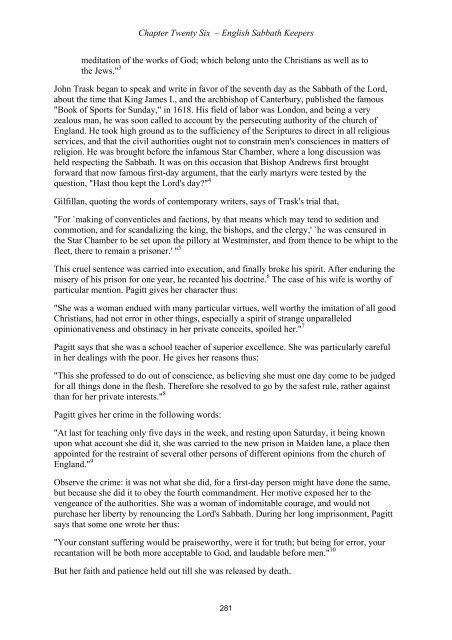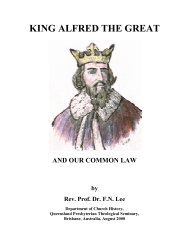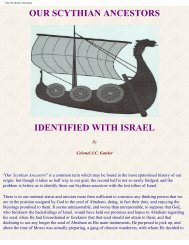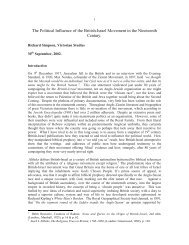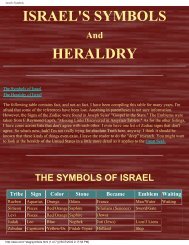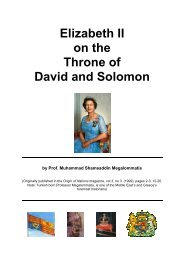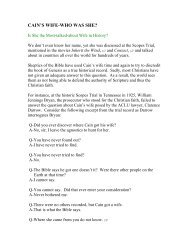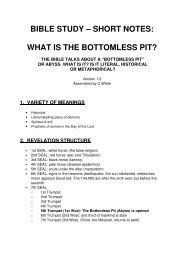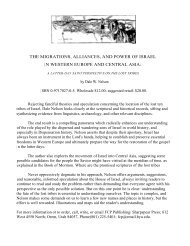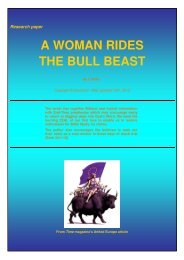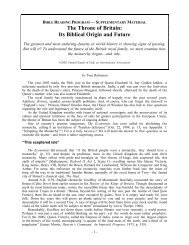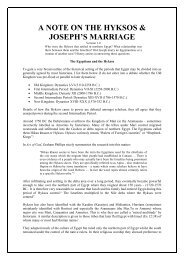HISTORY OF THE SABBATH - Friends of the Sabbath Australia
HISTORY OF THE SABBATH - Friends of the Sabbath Australia
HISTORY OF THE SABBATH - Friends of the Sabbath Australia
Create successful ePaper yourself
Turn your PDF publications into a flip-book with our unique Google optimized e-Paper software.
Chapter Twenty Six – English <strong>Sabbath</strong> Keepersmeditation <strong>of</strong> <strong>the</strong> works <strong>of</strong> God; which belong unto <strong>the</strong> Christians as well as to<strong>the</strong> Jews." 3John Trask began to speak and write in favor <strong>of</strong> <strong>the</strong> seventh day as <strong>the</strong> <strong>Sabbath</strong> <strong>of</strong> <strong>the</strong> Lord,about <strong>the</strong> time that King James I., and <strong>the</strong> archbishop <strong>of</strong> Canterbury, published <strong>the</strong> famous"Book <strong>of</strong> Sports for Sunday," in 1618. His field <strong>of</strong> labor was London, and being a veryzealous man, he was soon called to account by <strong>the</strong> persecuting authority <strong>of</strong> <strong>the</strong> church <strong>of</strong>England. He took high ground as to <strong>the</strong> sufficiency <strong>of</strong> <strong>the</strong> Scriptures to direct in all religiousservices, and that <strong>the</strong> civil authorities ought not to constrain men's consciences in matters <strong>of</strong>religion. He was brought before <strong>the</strong> infamous Star Chamber, where a long discussion washeld respecting <strong>the</strong> <strong>Sabbath</strong>. It was on this occasion that Bishop Andrews first broughtforward that now famous first-day argument, that <strong>the</strong> early martyrs were tested by <strong>the</strong>question, "Hast thou kept <strong>the</strong> Lord's day?" 4Gilfillan, quoting <strong>the</strong> words <strong>of</strong> contemporary writers, says <strong>of</strong> Trask's trial that,"For `making <strong>of</strong> conventicles and factions, by that means which may tend to sedition andcommotion, and for scandalizing <strong>the</strong> king, <strong>the</strong> bishops, and <strong>the</strong> clergy,' `he was censured in<strong>the</strong> Star Chamber to be set upon <strong>the</strong> pillory at Westminster, and from <strong>the</strong>nce to be whipt to <strong>the</strong>fleet, <strong>the</strong>re to remain a prisoner.' " 5This cruel sentence was carried into execution, and finally broke his spirit. After enduring <strong>the</strong>misery <strong>of</strong> his prison for one year, he recanted his doctrine. 6 The case <strong>of</strong> his wife is worthy <strong>of</strong>particular mention. Pagitt gives her character thus:"She was a woman endued with many particular virtues, well worthy <strong>the</strong> imitation <strong>of</strong> all goodChristians, had not error in o<strong>the</strong>r things, especially a spirit <strong>of</strong> strange unparalleledopinionativeness and obstinacy in her private conceits, spoiled her." 7Pagitt says that she was a school teacher <strong>of</strong> superior excellence. She was particularly carefulin her dealings with <strong>the</strong> poor. He gives her reasons thus:"This she pr<strong>of</strong>essed to do out <strong>of</strong> conscience, as believing she must one day come to be judgedfor all things done in <strong>the</strong> flesh. Therefore she resolved to go by <strong>the</strong> safest rule, ra<strong>the</strong>r againstthan for her private interests." 8Pagitt gives her crime in <strong>the</strong> following words:"At last for teaching only five days in <strong>the</strong> week, and resting upon Saturday, it being knownupon what account she did it, she was carried to <strong>the</strong> new prison in Maiden lane, a place <strong>the</strong>nappointed for <strong>the</strong> restraint <strong>of</strong> several o<strong>the</strong>r persons <strong>of</strong> different opinions from <strong>the</strong> church <strong>of</strong>England." 9Observe <strong>the</strong> crime: it was not what she did, for a first-day person might have done <strong>the</strong> same,but because she did it to obey <strong>the</strong> fourth commandment. Her motive exposed her to <strong>the</strong>vengeance <strong>of</strong> <strong>the</strong> authorities. She was a woman <strong>of</strong> indomitable courage, and would notpurchase her liberty by renouncing <strong>the</strong> Lord's <strong>Sabbath</strong>. During her long imprisonment, Pagittsays that some one wrote her thus:"Your constant suffering would be praiseworthy, were it for truth; but being for error, yourrecantation will be both more acceptable to God, and laudable before men." 10But her faith and patience held out till she was released by death.281


